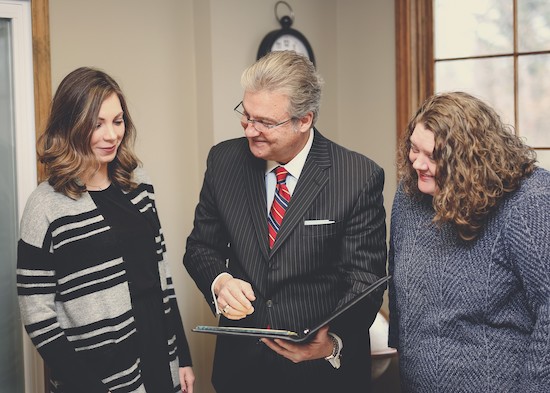Estate Planning Attorney in Novi
Our estate planning attorneys in Novi, Michigan have over 40 years of experience in creating estate plans. We have successfully assisted hundreds of clients with estate plans. Now may be the time to contact our Michigan Estate Planning attorney if you’re looking to update your estate plan, will or trust.
If you have questions about estate planning or an existing will or trust, contact our Novi office. Unlike some law firms, we pride ourselves on personalized service and estate planning solutions. And we’ll make sure you fully understand your options.
Call us today at (248) 650-0055 to find out how our Novi lawyers can help you.

At Sumner & Associates, P.C., our estate and wills attorneys handle a wide variety of issues, including:
- Comprehensive estate planning,
- Drafting wills and trust documents,
- Estate and trust administration,
- Guardianships and conservatorships,
- Powers of Attorney,
- Probate proceedings, and
- Special needs planning (if you or a loved one have serious disabilities).
With Avvo listing over 98 5-star reviews, please contact us and you’ll experience our “Excellence in Service” first hand!
Contact Us
Excellent
Based on 89 reviews
Danny Mason
January 12, 2024.
Scott Sumner and his team have developed a thorough process to create Wills and Trusts. Using a multi-phase approach to complete each step, they made sure we had time to review and understand what we're doing. After the signing we had a nearly complete, thoughtfully organized binder that will make it so much easier to put to use when needed. It wasn't complete because they also included a list of the additional documents and next steps that we need to add and maintain to have everything in one spot for our heirs. Passing is inevitable. But Sumner and Associates have provided us peace mind by creating a document that will ease the administrative burden on our children after we're gone and helped us ensure that our assets pass quickly to our heirs and not spent unnecessarily in time or money in probate.
Tom Horlacher
January 12, 2024.
Very nice and informative team @ Sumner n Associates. We are very satisfied with their performance.
pritish khale
December 7, 2023.
We had this wonderful opportunity to do our estate planning and the whole experience was great. Sean Parent was our legal advisor and he was excellent in explaining the details, making sure we understood everything and was very responsive. Sarah and Rori also helped out. Overall great team of attorneys and paralegals and would definitely recommend anyone who is looking to estate planning. Keep up the good work. Your top notch quality of service matters.
Jamie Brooks
November 16, 2023.
I would highly recommend this firm. Great communication throughout the entire process of getting my trust/will completed. Sean was very professional and explained every process thoroughly and Sarah was very helpful throughout the process as well. Thank you for everything!
Lisa Harris
October 21, 2023.
Folks at Sumner were professional, kind, intuitive and on point throughout. Highly recommend them. Thanks.
Michelle Walker
October 14, 2023.
Great professional service, very informative, I recommend.
Jillian Bachleda
September 21, 2023.
We have nothing but positive things to say! It was an amazing experience. We were provided with all the information we needed to fully understand all the estate planning documents and he took the time to let us ask questions / clarify misunderstandings. He was patent, informative and ensured we 100% understood every document we signed. Very glad we went with Summer and Associates!
MARK CANDELA
September 6, 2023.
Recently had a great experience with Scott Sumner and his staff. Very professional with excellent people skills. Scott provided a complete estate planning trust. Service was great and information provided was very detailed. I would highly recommend Sumner and associates for any estate planning needs.
Brian Hart
August 11, 2023.
The office was phenomenal in helping my wife and I establish our trust. Very informative every step of the way. Thank you!
Carol Zachrich
July 25, 2023.
Great experience! This team has the estate planning process down to a science. Very efficient, timely and responsive. Appreciate their expertise and demeanor. Highly recommend!
Frequently Asked Questions for Estate Planning Attorney Novi
- How long does it take to establish a living trust estate plan?
- What can I expect what I start the estate planning process with an attorney?
- How to fund your living trust?
- What type of assets would typically be used to fund the trust?
- How do I coordinate beneficiaries on my retirement accounts and life insurance with my trust?

How long does it take to establish a living trust estate plan?
A typical process from the talking with an attorney in the original planning meeting to finalizing your living trust estate plan should take 4-6 weeks, or less. The living trust is not established until it is properly signed by the person making the trust.What can I expect when I start the estate planning process with an attorney?
A planning process in an efficient and well-run estate planning practice should consist of a pre-meeting intake form to detail your specific information such as your names, address, contact information, family, and asset information. Next, is a meeting with an estate planning attorney to discuss, provide advice and establishing an outline for client’s estate plan documents. The attorney you meet with on phone, zoom or in person will ask all the necessary questions and gather all the right information needed to prepare an outline of your estate plan. This outline includes the names of people or institutions you will name as your fiduciaries and beneficiaries. Post meeting follow up with office will include– signing a written retainer agreement that spells out exactly what will be provided and at what fees. Then you will need to update your assets list if you have not provided the details in your intake. The hardest part of client homework is finding and providing a copy of the house deed. Your attorney will need the deed to your house, to gather accurate information to prepare another deed, to point your house into your Living trust. Document review at time of signing– Depending your retainer arrangement, you may be provided the opportunity to review documents prior to the execution. However, most document reviews take place the time the document are signed in the attorney’s office. This maintains efficiency and certainty of clients understanding and intent, at time of signing. Execution of your Estate Planning Documents in our office and how that looks– When the time comes to sign all the estate planning documents prepared for you, there will be an “execution ceremony” scheduled. Don’t worry, no one will get shot, but your documents will be legally executed before proper witness and notary laws. Your attorney will sit with you and go through each document as they are signed and explain “what is happening” and “who is involved” in each document, as you sign. After all the documents are properly executed and client questions are answered, we move onto the Funding & Beneficiary Coordination meeting. During this time our attorney sits with the client and reviews and discusses that proper ways to fund the living trust and how to coordinate the beneficiary designation of retirement accounts and life insurance beneficiaries. Our office even provides a custom information sheet for client’s future use in identifying how to title assets and name beneficiaries on accounts, in the future.How to fund your living trust?
Once a Revocable Living Trust has been established, it needs to be funded. Funding means that assets need to be retitled into the name of the trust. I suggest this metaphor to my clients: Think of your trust as a big box I got from CostCo and set it upon the conference room table. Then, you get out a Sharpie marker and write on the side of the box, who will manage the assets in the box upon your death and who the beneficiaries will be. Once you write the names on the side of the box, you sign your name to it. Now, when you pass, this box gets pushed across the table to your successors to distribute your assets, but they find nothing in the box. The reason there is nothing in the box, is because you died with all your assets in your name. You did not transfer assets from your name into the box. Your Revocable Living Trust needs to be funded with assets during your lifetime, so these assets will not be in your name when you pass. By retitling assets during your lifetime, into your living trust, these assets will be able to avoid the delays and cost of Probate Court. If assets are retitled into the trust before the trust maker passes, these assets will avoid probate. However, if the trust maker fails to transfer assets into the trust during his/her lifetime, then those assets may be subject to the probate process.What type of assets would typically be used to fund the trust?
Typically, your living trust would be funded with certain classes of assets that are not “deferred assets”. For example, retirement accounts are deferred tax assets and are not used to fund a trust. Life insurance death benefits are deferred and not attainable during a person’s lifetime. Assets that would be funded into a Revocable Living Trust, immediately upon being established are:- Real Estate.
- Bank Accounts, Credit Union Accounts, Certificates of Deposit, Money Market Accounts.
- Investment & Brokerage Accounts (non-retirement stocks, mutual funds, bond funds.)
- Retirement accounts- 401k, 403b, IRA’s, ROTH IRA and all deferred retirement accounts.
- Annuities and Pensions.
- Life Insurance.
- (Although it is not a deferred asset, vehicles do not go into the trust. This is for liability purposes.)
